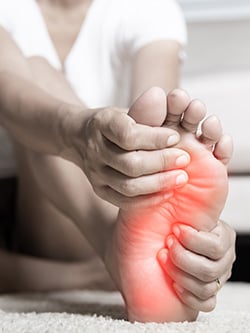Summarize This Article:
Summarize This Article:

“The success of this procedure and its ability to improve a patient’s quality of life are truly remarkable – especially given the conventional belief that there isn’t an existing treatment for neuropathy. As medical research and technological advancements further improve the field of diabetic neuropathy, ideally patients will undergo surgery before developing complications such as pain, ulcerations, and amputations.” Dr. Michael Rose, MD
Nerve Decompression Surgery is an innovative, minimally invasive procedure performed to relieve the symptoms of neuropathy and reduce the risk of amputation – a common side effect associated with Diabetes. It is an outpatient procedure that involves three small incisions, lasts approximately an hour and a half, and is accepted by most insurance companies. Most patients are back to basic activities in two to three weeks. In addition to the surgery providing immediate relief to the patient, postoperative discomfort is minimal, and results are long-lasting, almost never requiring a second procedure. In 75% of properly selected patients, there will be a significant increase in sensation and a decrease in pain.
“The success of this procedure and its ability to improve a patient’s quality of life are truly remarkable – especially given the conventional belief that there isn’t an existing treatment for neuropathy. As medical research and technological advancements further improve the field of diabetic neuropathy, ideally, patients will undergo surgery before developing complications such as pain, ulcerations, and amputations.” – Dr. Michael Rose, MD.
Decompression surgery has been performed for more than 15 years to relieve pressure on the peripheral nerves as they pass through three different passageways or tunnels on their way to each extremity. By releasing the swollen, damaged nerve, doctors allow room for the nerve to “breathe” and remove compression. In addition to restoring sensation and reducing pain, the surgery also reduces the future occurrence of ulcers or amputations to nearly zero. Dr. Michael Rose, MD, is among a select group of surgeons to perform the procedure.
The success of this procedure and its ability to improve a patient’s quality of life are truly remarkable. While the procedure is most often used to treat neuropathy from diabetes, it will also relieve the symptoms of neuropathy from many other causes, such as alcoholism, lead poisoning, and chemotherapy. Ideally, patients will undergo surgery before developing complications such as pain, ulcerations, and amputations.
Blood glucose testing → participate in physical activities → choosing the right foods
The best way to prevent neuropathy is to keep blood glucose levels as close to the normal range as possible. Maintaining safe blood glucose levels protects nerves throughout the body.


